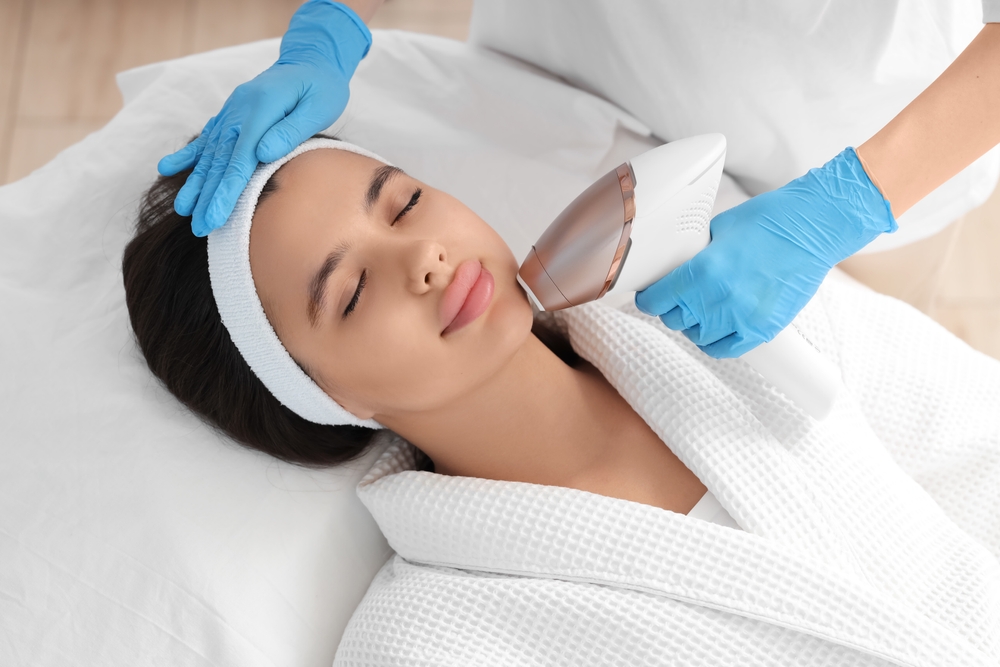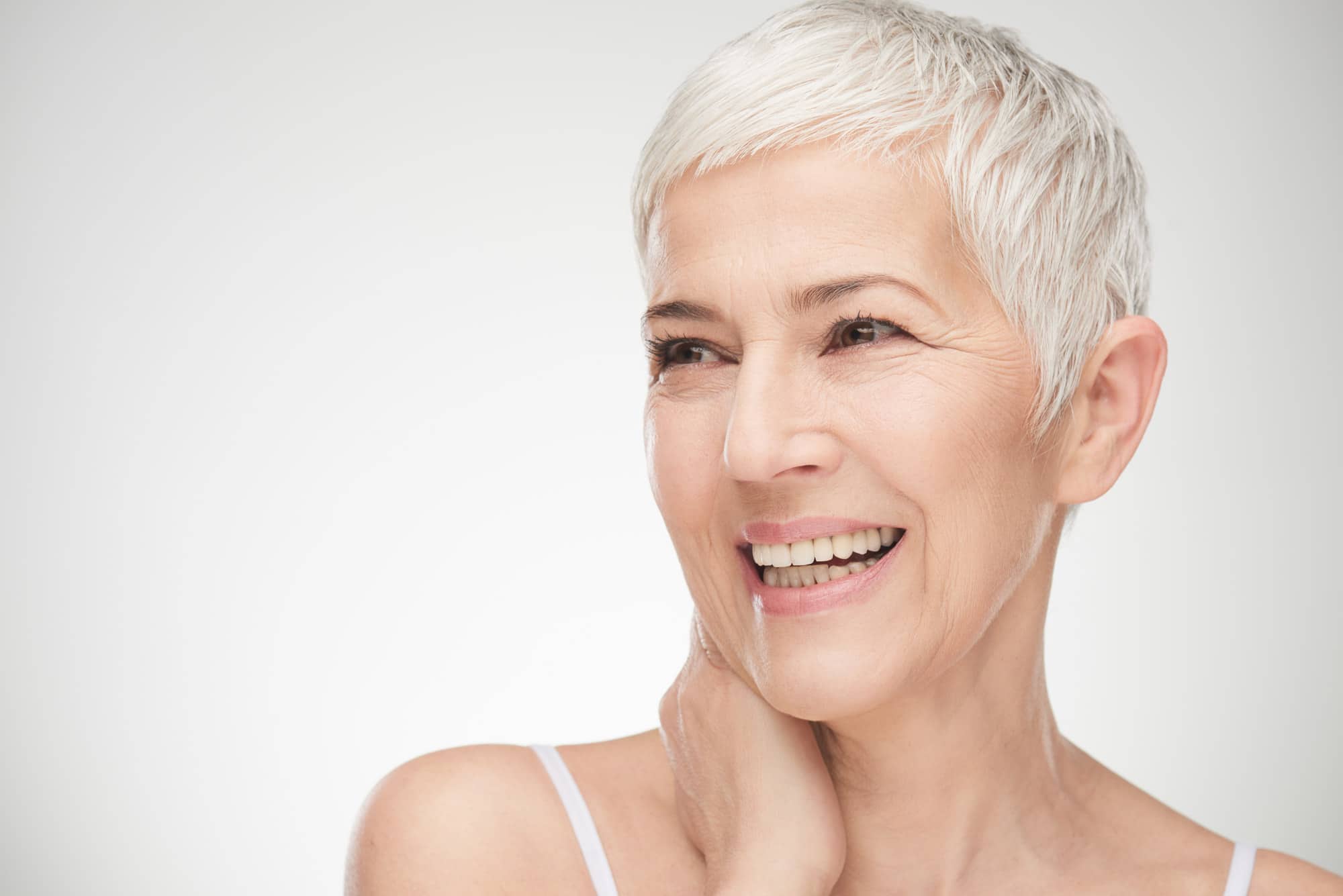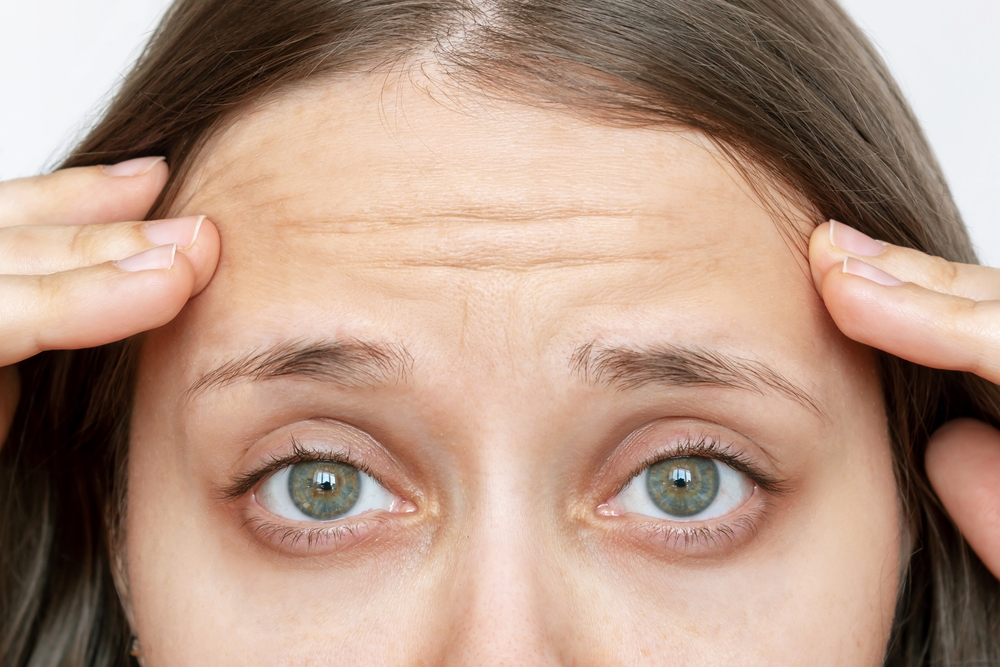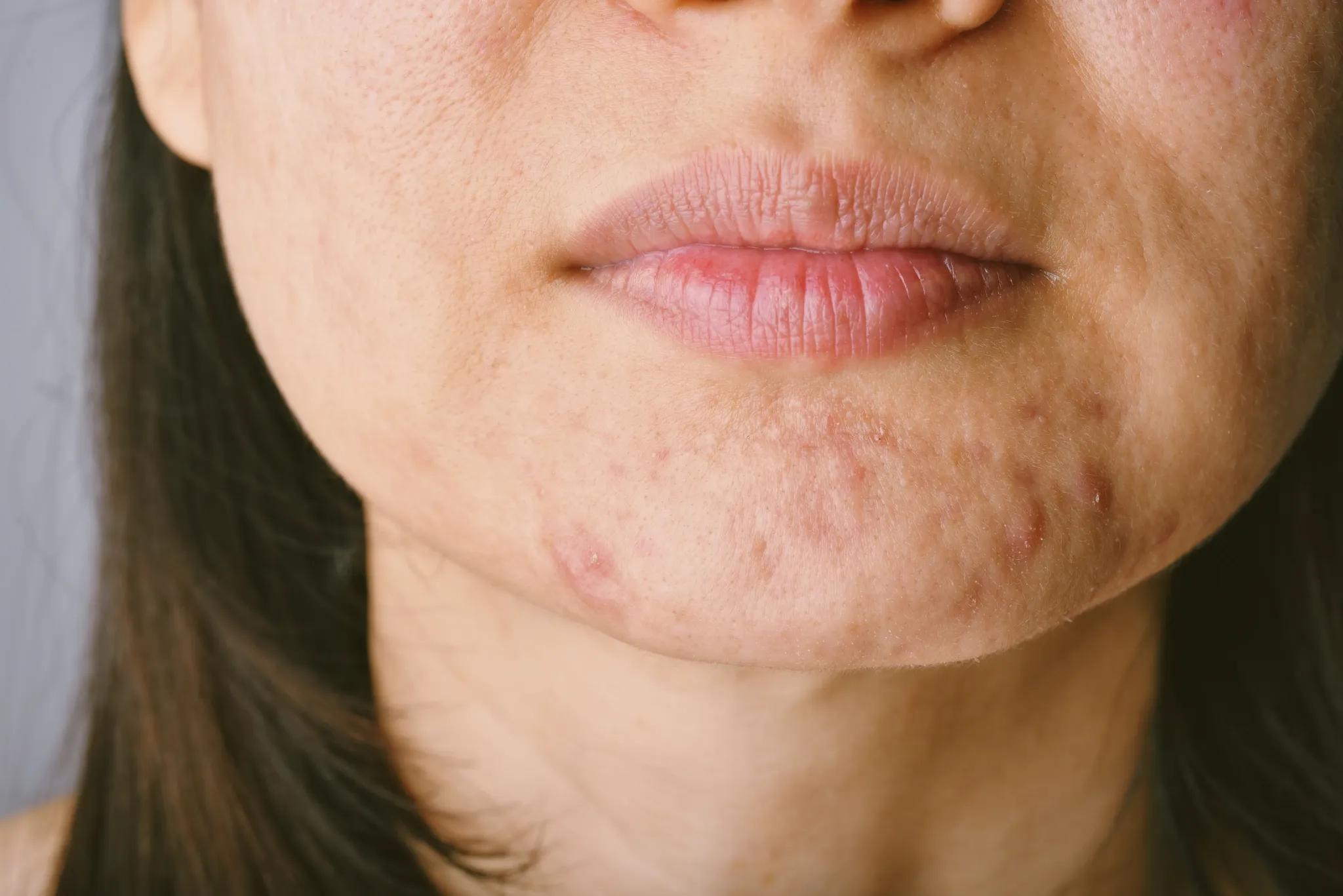
Everything You Need to Know About IPL Laser Treatment
In the evolving world of advanced skincare, IPL laser treatment has become one of the most sought-after solutions for those looking to improve skin clarity,
Our unique approach enables us to look beneath the surface of the skin and simulate your results prior to treatment. Learn more >
Results simulator now available. Learn more >

We hear a lot about the unpleasant side effects of menopause: hot flashes, brain fog and low libido. All thanks to dwindling levels of the female sex hormone estrogen. But what does it do to your complexion?
Studies have shown that estrogen plays a key role in collagen production, skin elasticity, thickness, moisture levels, and healthy blood vessels. When you produce less estrogen, you may start to see the opposite, forming lines and wrinkles, dryness, sensitivity, dullness, and sagging.
Menopause will affect all people who menstruate at a certain point in their lives. It is important to learn more about this time of transition and its impact so that you can navigate these changes with confidence, understanding and ease.
There’s a lot to be aware of, from menopausal hair loss to anxiety and mood fluctuations. For some, menopause symptoms can begin several years before the change itself, in a period known as perimenopause, which can start around the age of 40.
As well as increased dryness, your skin’s steady decline in elastin will have also dropped significantly since your 20s, meaning you might notice sagging around the eyes, neck and cheeks, the areas where we naturally hold more fat. Wrinkles may appear deeper, and falling estrogen levels mean that dryness, sensitivity, and redness can also become common problems. The skin of perimenopausal or postmenopausal women is far more likely to react to sun exposure, dietary changes and lack of sleep than younger women.
There are many treatment options for menopausal skin changes, including pharmaceuticals (in consultation with a medical practitioner), cosmetic treatments and lifestyle measures. Treatment should be tailored to suit your skin concerns and other menopausal symptoms. However, all menopausal women will benefit from incorporating lifestyle measures into their treatment plan.
Balanced nutrition is an important component of protecting skin from aging. Declining estrogen levels can negatively impact your metabolism. There is evidence that certain foods may help relieve some symptoms of menopause. A whole-food diet high in fruits, vegetables, whole grains, high-quality protein and dairy products may reduce menopause symptoms. Phytoestrogens and healthy fats, such as omega-3 fatty acids from fish may also help.
High-stress levels can affect your skin and make it drier and more sensitive. It can also trigger conditions like psoriasis. Try yoga, meditation, and other stress-reduction techniques to help you relax.
Exercise does more than just tone your muscles. It helps the skin in two ways. It’s a great stress buster and boosts circulation. Extra oxygen and blood flow can help your skin look brighter and healthier.
Getting enough sleep is one of the best things you can do for your overall health. Sleep can help prevent dark circles under your eyes, and it also gives the rest of your body a chance to recharge. Lack of sleep can change your hormone levels and metabolism in many ways that aging does. So aim for a solid 7 to 9 hours of beauty sleep every night.
Many highly-effective non-surgical treatment options are available to leave your skin looking rejuvenated, fresher, and brighter. The goal is to enhance your natural beauty and celebrate healthy aging.
We recommend a consultation and facial assessment using our cutting edge VISIA Skin Analysis. Our expert clinical practitioners can then provide you with a personalised treatment plan tailored to your skincare needs.
Anti-wrinkle injections are a safe and effective treatment that can reduce visible fine lines and wrinkles. This non-surgical treatment relaxes muscles, allowing the skin and collagen to repair. Anti-wrinkle Injections can restore and revitalise your appearance and prevent future deep lines and wrinkles from forming by relaxing the muscle. Learn more about our anti-wrinkle injections.
Over time our body’s ability to produce collagen and elastin decreases. Our skin’s once youthful appearance is affected by a loss of volume. Dermal fillers address this by adding volume to the affected areas. They can fill creases, folds, hollows, and acne and surgical scars. Our experienced team can volumise certain areas and enhance your features while still looking natural. Learn more about our filler treatments.
CoolPeel CO2 laser treatment provides instant skin rejuvenation without the downtime of other CO2 lasers. Treatments are tailored specifically to your skin type and goals. They are gentle enough to target only the superficial layers of damaged skin while still powerful enough to improve lines and wrinkles while firming your skin. Learn more about the CO2 CoolPeel treatment.
Erbium Glass Laser is designed to tighten and plump the skin and can improve fine lines and wrinkles, pigmentation, open pores and stretch marks. It triggers the body’s natural healing process encouraging collagen and elastin regeneration, which results in firmer, fresher, and younger-looking skin from the inside out. The healing process works to reduce the visibility of lines and wrinkles, scarring and texture imperfections. Learn more about the Erbium Glass Laser treatment.
Around the age of 40, women start to lose about 2 per cent of their collagen, elastin, and natural hyaluronic acid production annually. Some women experience dryness and oiliness of the skin simultaneously during perimenopause, while others battle acne, dullness, and age spots. It is important to use skincare products to support estrogen-deficient skin during every stage of its menopausal journey, whether it’s peri, meno, or post.
This will depend on your skincare concerns and how well your skin tolerates active ingredients such as retinol. We look at a few popular skincare options for looking after your skin during every stage of its menopausal journey, whether it’s peri, meno, or post. You can do plenty at home by using the right products to help soften and even reverse some of these menopause-related skin changes.
Dryness can signify that your skin’s outer protective barrier has been compromised. The skin’s epidermis thickens as estrogen levels fall, reducing oil production. When skin lacks moisture, it can also get quite dry, sensitive and itchy. Extra hydration is required to prevent excess water loss from the skin surface.
The fix: Switch to a mild or gentle cleanser that won’t strip skin of its essential oils ( try a creamy or oil-based cleanser, not a foaming one). Then support the skin’s barrier with a moisturiser featuring ingredients such as ceramides, shea butter, fatty acids, squalene, glycerin, and hyaluronic acid, which add moisture and help keep it there.
Menopause-induced dryness along with decreased cell turnover due to age can make skin look dull and lacklustre.
The fix: Exfoliate dead, dull skin. Exfoliation is key to keeping skin looking glowy. Alpha hydroxy acids (AHAs) will help remove dead skin to reveal brighter skin. Glycolic acid, an AHA, is ideal because it’s a humectant, which means it attracts moisture. Use a glycolic-containing serum every other day if your skin can tolerate it.
The culprit here is your decreasing supply of collagen. You start to lose about one per cent of your collagen each year in your 30s, but that depletion quickly escalates during post-menopause.
The fix: Try using topical retinoids (prescription or OTC retinol serums), which stimulate collagen production and cell turnover, making the skin smoother. Retinols alter the behaviour of aging cells so that they act in a more youthful way, regenerating at a faster rate. But they can also be drying on the skin at first, so if you’re a first-time user, start to gradually introduce a retinol-based night cream into your routine 2-3 times a week. Look for formulations with hydrating and soothing ingredients – like hyaluronic acid, glycerin and niacinamide. These are particularly helpful at mitigating any dryness and sensitivity associated with first-time retinol use and menopausal skin.
Does your skin remind you of your pre-pubescent self? You might be asking yourself – if my skin is getting drier, why am I still breaking out? As estrogen levels decrease, the ratio of female-to-male hormones changes, with male hormone levels increasing. And those male hormones, called androgens, are one of the main causes of pimples.
The fix: Again, this is a job for retinol. It boosts cell turnover, and pores stay clear and are less likely to clog and form a pimple. Plus, this multitasking miracle ingredient can clear breakouts and soften lines at the same time.
Just as collagen depletes with age, so does its partner in crime – elastin. Elastin keeps our skin taut. Many women experience a loss of skin elasticity around their jawlines and neck.
The fix: To prevent sagging, sunscreen and antioxidants (vitamins C, E, and Co-Q10, to name a few) are essential. Research has shown that estrogen protects against photoaging, so preventing sun damage is especially important as estrogen levels fall.
It’s not just the skin on your face that can suffer during menopause. Use barrier-strengthening formulas to inject moisture into your skin and avoid harsh fragrances that could disrupt your skin’s natural pH or cause irritation.
With menopause comes a change in hormone levels which can trigger a hot and clammy complexion. Calming skincare products and face mists can be life savers when you’re having a hot flush or concerned about redness. If you’re waking up during the night, it’s good to keep a refreshing, hydrating face mist by your bed and use this as a soothing spray to cool flushed skin.
To learn more about the health of your skin and how we can help you age fabulously and support your skin through this time of transition and change, contact our team today!

In the evolving world of advanced skincare, IPL laser treatment has become one of the most sought-after solutions for those looking to improve skin clarity,

Forehead wrinkles are among the first visible signs of ageing and often appear earlier than expected. These lines result from repeated facial expressions, environmental exposure,

Struggling with chin breakouts that just won’t disappear? You’re not alone. Acne in this area tends to be stubborn and persistent, often showing up as
"*" indicates required fields
Excellent, we are always excited to meet a new face or to welcome back a familiar one. Contact us in the way that best works for you!
© 2022 Bondi Junction Cosmetic Clinic. All rights reserved.
Enter your details and we will contact you within 24 hrs.
"*" indicates required fields